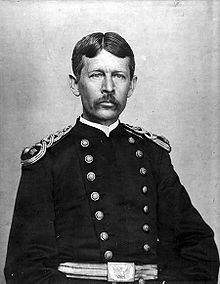Walter Reed
Walter Reed (born September 13, 1851 in Belroi , Virginia , † November 22, 1902 in Washington, DC ) was an American military doctor , pathologist and microbiologist. He became famous for his work on yellow fever .
life and work
Reed grew up in Belroi, Gloucester County, in western Virginia . He attended the University of Virginia , where he graduated with an MD in 1869 at the age of only 17. He then attended Bellevue Hospital Medical College at New York University , where he earned a second MD in 1870. In New York City , he then worked as a doctor. In 1876 he married Emily Lawrence there. The marriage had two children. The couple also adopted an Indian girl.
Reed joined the US Army Medical Corps in the 1880s and served in the American West until 1893. In addition, he continued his medical and scientific training, including in pathology at the Johns Hopkins University Hospital . In 1893 he received a professorship for bacteriology and clinical microbiology at the newly opened Army Medical School in Washington, DC After the outbreak of the Spanish-American War , he traveled to Cuba in 1899 to study the medical problems of the American army . The American army had suffered far greater losses from disease, especially yellow fever, in this war than from actual fighting.
The studies by Reed and co-workers showed that yellow fever was not transmitted, as is often assumed, through soiled clothing or excrement from yellow fever sufferers, but rather through mosquito bites. Protection against mosquito bites, for example by using mosquito nets , was therefore decisive for combating yellow fever .
The construction of the Panama Canal only became possible in the years 1906–1914 thanks to the work of Reed and employees . An attempted canal construction under the direction of Ferdinand de Lesseps in the years 1881-1889 had failed, among other things, due to the very high death toll from the uncontrollable yellow fever. Because of his work he received numerous honors, including a. from Harvard University and the University of Michigan . Walter Reed died of perforated appendicitis shortly after his discovery in 1902 at the age of 51 . He is buried in Arlington National Cemetery . The Walter Reed Military Hospital is named after him.
literature
- Walter Reed, Jas. Carroll, Aristide Agramonte: The etiology of yellow fever. An additional note. In: The journal of the American Medical Association. 36, 7, 1901, ISSN 0098-7484 , pp. 431-440.
- William B. Bean: Walter Reed. A biography. 2. printing. University Press of Virginia, Charlottesville VA 1982, ISBN 0-8139-0913-9 .
- William B. Bean: Reed, Walter . In: Charles Coulston Gillispie (Ed.): Dictionary of Scientific Biography . tape 11 : A. Pitcairn - B. Rush . Charles Scribner's Sons, New York 1975, p. 345-347 .
- Paul de Kruif : Walter Reed. The scare away of yellow fever. In: Paul de Kruif: Microbe hunters. (Original edition: Microbe Hunters. Harcourt, Brace & Co., New York 1926) Orell Füssli Verlag, Zurich / Leipzig 1927; 8th edition, ibid. 1940, pp. 301–322.
Web links
- Walter Reed Army Institute of Research (English)
- Philip S. Hench Walter Reed Yellow Fever Collection (English)
| personal data | |
|---|---|
| SURNAME | Reed, Walter |
| BRIEF DESCRIPTION | American bacteriologist |
| DATE OF BIRTH | September 13, 1851 |
| PLACE OF BIRTH | Belroi , Virginia |
| DATE OF DEATH | November 22, 1902 |
| Place of death | Washington, DC |
